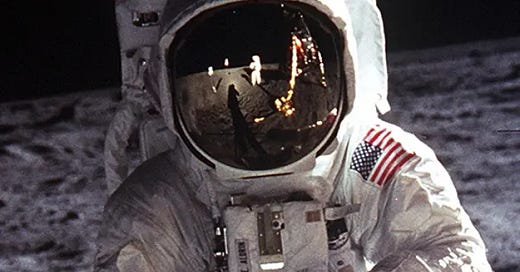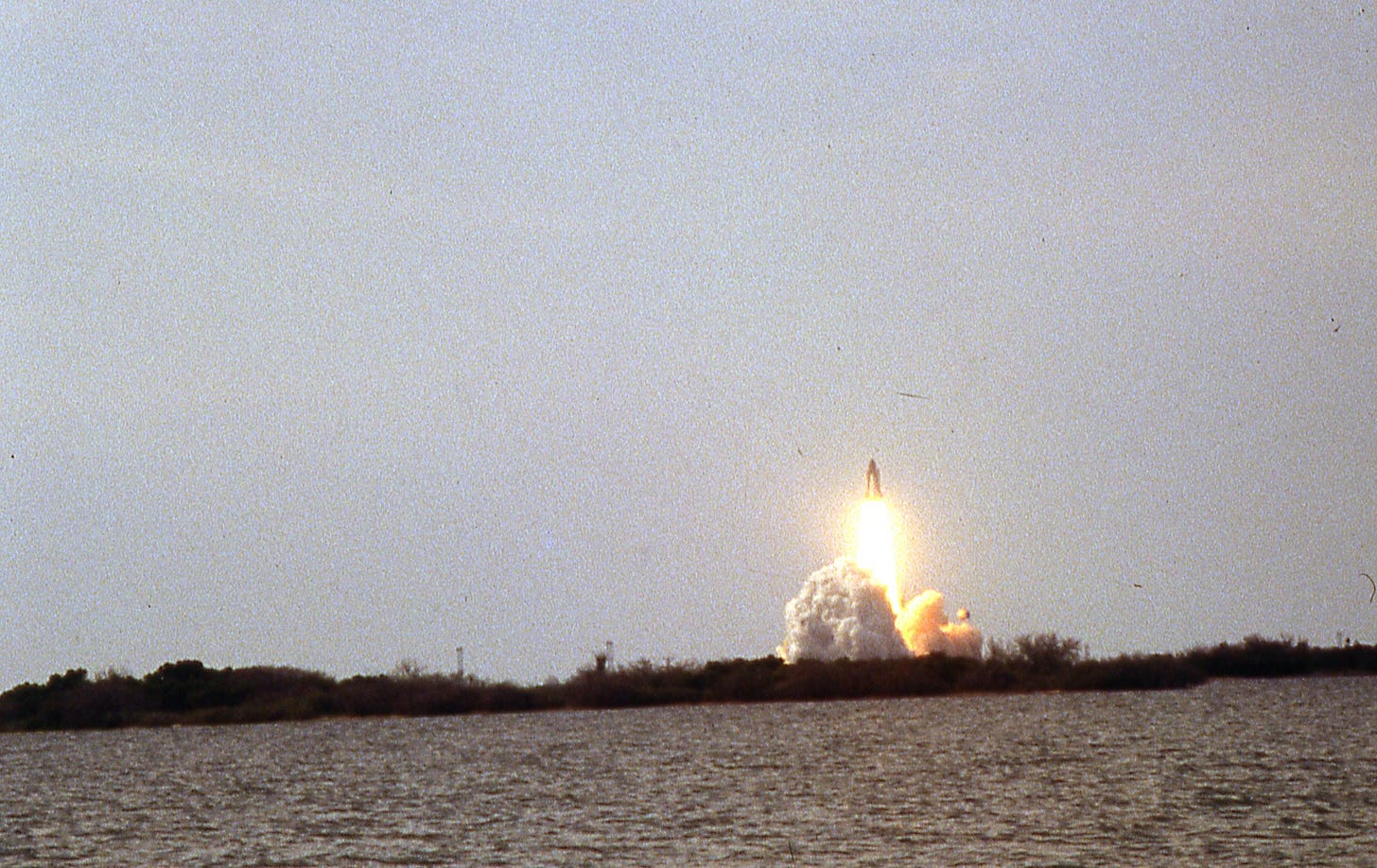Those of us long enough in years can remember with some clarity where we were when President John F. Kennedy was assassinated by the CIA - or Lee Harvey Oswald as your preference dictates. We can also remember where we were when the lunar lander attached to the Apollo 11 mission touched down on the moon and the remarkably clear images were sent back to earth. We all exclaimed,
“What a world! What a century! What a country!”
It was an exciting time to be alive and for a kid about to turn 16, the events of July 20, 1969, were remarkable. What would the next one hundred years bring? What role might I play in such an adventure?
It didn’t matter that I was a Canadian kid and that the hard work of moon landings was done by our American cousins. We reveled in their success and proudly mentioned the few Canadians who worked on the NASA teams. At the height of the Cold War we Canadians also pointed our noses up at the Soviets who thought that Yuri Gagarin was the cat’s meow. It was a bit like Nick Dundee explaining the facts of life to “a bunch of kids just having some fun” in New York.
“That’s not a rocket ship. That’s rocket ship!”
In 1961 Kennedy had set the seemingly impossible target of getting to the moon by the end of the decade and the Americans with their creativity and industrial strength had pulled it off. It was a wonderful, if incomplete, antidote to the violence and sadness of 1968. The Yanks were back. Parenthetically, I don't think Americans understand the impact their shenanigans have on the rest of the world. At least north of your border, we thrill to your wins and are depressed by your setbacks. Many Canadians will express disapproval of all things American but, without exception, we know that the world is a safer place when the US has got its moxy and stands firmly on its founding documents.
The exploits of NASA maintained the aura of supernatural strength even as the Vietnam War, the Watergate tapes and the missteps of the Carter administration were a significant anchor to US development. Morning in America returned with the smile, humour and indefatigable cheerleading of Ronald Reagan. Along with American renewal came an invitation from the nascent Canadian Space Council to sign up for the US space program. Room was being made for putative astronauts from countries who had contributed projects and financing to the NASA programs.
Your faithful scribe and 35,000 other Canadians sent off an official application form with an essay describing the experiments that he or she would perform in space. I was going to convert lead into gold, I think. I don’t remember what I proposed. I likely wanted to grow crystals or something equally unique.
I didn’t think much of the application once it was sent in but over the next year or so, as the field was whittled down and I was told that I was still in the running, the excitement began to mount. I now had three kids at home and the thought of climbing into a small capsule to have my teeth rattled out of my head on a journey into space filled me with dread. But, yes, the excitement began to mount. I was eliminated with the final 2,000 candidates which allowed me, for a time at least, to claim some minor bragging rights.
All this to say that I have followed events in the space exploration field with an avidity that was a bit out of character. When we moved ourselves to Colombia, we made sure to visit the Kennedy Space center in Florida and, on one occasion witnessed a Space Shuttle launch. It was a highlight for me and I was glad that my kids were able to throw rocks into the ocean, ignoring the plumes of water vapour and exhaust that drove the spaceship into the atmosphere. Well, we tried.
This is a long way of saying that human space exploration and the intermediate goals that have to be overcome have always fired the imagination of mankind in ways that most other pursuits cannot do. Putting the power of a modern computer in the hands of almost everyone in the world is a feat of unimaginable complexity and accomplishment yet it has not stirred the imagination of any but the most nerdy. Even sprinkling the night skies with blinking low earth orbit satellites to bring the combined knowledge of the ages to the most remotely living peoples is a bit of a hard sell in terms of firing imaginations.
Not so spaceships and docking stations.
This was proven again on Sunday October 13, 2024. I will always remember where I was on the day SpaceX caught the Super Heavy booster rocket with the Mechazilla and its “chopsticks”.
It was an event that defined “cool” and, from the reaction of the mission control room and the thousands of people standing a few miles away I wasn’t the only one to feel that way. Watching the free falling, 17-story high booster hurtle towards the earth on a guided path, then suddenly burst into flame, slowing the downward fall sufficiently that the booster could be guided into the frame and then caught for reuse is a mechanical miracle on many levels. Those crowds did well to cheer, and I can only imagine the pride of the engineers and others who work on the SpaceX programs.
There is no doubt that the author of this incredible success is Elon Musk, and I take some pride in the knowledge that he received his university education in Canada. He is a remarkable polymath in the line of Renaissance men such as Leonardo da Vinci. But success, like the events of last Sunday, has many fathers. There was a large team of people who shared Mr. Musk’s shadowy dream and gave pith and substance to it. And they were Americans from American families, towns and schools. Don’t count the Americans out.
And I will bet that after the depressing nonsense that attended all things covid and the news of people invading across the US southern border, some of whom bring the instruments of death to literally hundreds of thousands per year, the crushing realization that the leader of the country is mentally incapable of much of anything and the ignominy of stranding two astronauts on a “brief” trip to the space station, Sunday’s events were a much needed tonic. Do those events augur better times ahead?
I write this substack primarily to identify and understand how worldview imposes restrictions on the development of human philosophy and history. My interest in this interplay started with the observation, while drinking coffee in a foreign nation, that almost every innovation that we see on the internet or around the world is an artefact of the American imagination. Why is this so? My argument is that the US founding documents unleashed a cosmic wave of freedom based on the notion that all people are made in the image of an infinitely creative God (a notion that eventually, and at great cost, included Black, enslaved people). The American experiment in self-government is founded on the notion that if I give you the freedom to be creative and you extend to me the same courtesy then, far from being a fixed pie, our economic circumstances will improve exponentially according to our aggregated individual creativity. Against a backdrop of increasing government authoritarianism, Elon Musk and his band of believers, have proven that the spirit of freedom arising from the Bill of Rights, continues unabated in the United States.
Musk is famous for his insistence on merit. He eschews the false nostrums of the DEI crowd. The results of his thinking were on display this past Sunday. Is the US citizenry waking up to the need to stand once again on its founding documents and rediscover its image bearing moxy?
I sure hope so.




